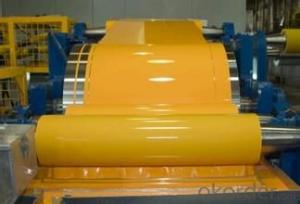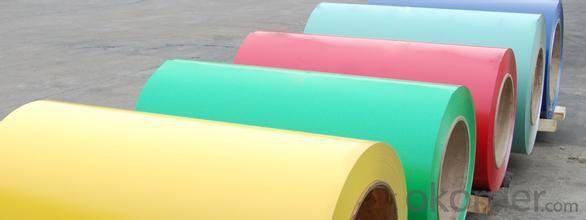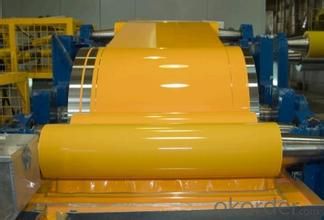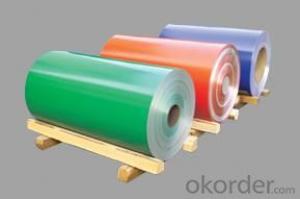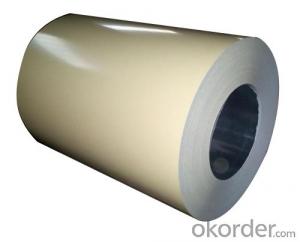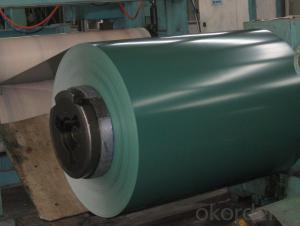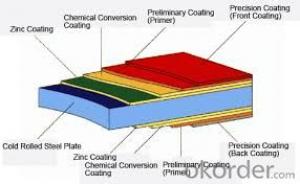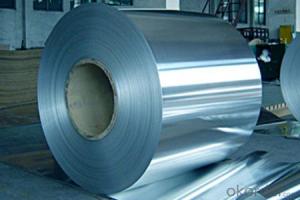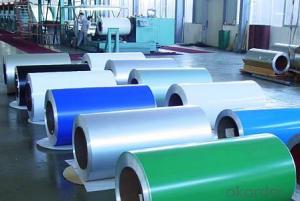Flat Rolled Aluminum Coil Illinois for Prepainted Aluminum Coil for Sandwich Panel
- Loading Port:
- China Main Port
- Payment Terms:
- TT OR LC
- Min Order Qty:
- -
- Supply Capability:
- -
OKorder Service Pledge
OKorder Financial Service
You Might Also Like
Aluminium is a relatively soft, durable, lightweight, ductileand malleablemetalwith appearance ranging from silvery to dull gray, depending on the surfaceroughness. It is nonmagnetic and does not easily ignite. A fresh film ofaluminium serves as a good reflector (approximately 92%) of visible lightand an excellent reflector (as much as 98%) of medium and far infraredradiation. The yield strength of pure aluminium is 7–11 MPa,while aluminium alloys have yield strengths ranging from200 MPa to 600 MPa. Aluminium has about one-third the densityand stiffness of steel. It is easily machined,cast, drawn and extruded.
Aluminium alloys (or aluminum alloys; see spellingdifferences) are alloysin which aluminium(Al) is the predominant metal. The typical alloying elements are copper, magnesium,manganese,silicon,tin and zinc. There are twoprincipal classifications, namely casting alloys and wrought alloys, both of which are furthersubdivided into the categories heat-treatableand non-heat-treatable. About 85% of aluminium is used for wrought products,for example rolled plate, foils and extrusions.Cast aluminium alloys yield cost-effective products due to the low meltingpoint, although they generally have lower tensile strengthsthan wrought alloys. The most important cast aluminium alloy system is Al–Si,where the high levels of silicon (4.0–13%) contribute to give good castingcharacteristics. Aluminium alloys are widely used in engineering structures andcomponents where light weight or corrosion resistance is required
Specification:
Alloy: AA1050, 1060, 1100,AA3003, 3005, 3015, 5052, 5754, 5083,8011, etc
Temper:H14/16/18/22/24/32, HO etc.
Thickness:0.2mm—100mm
Width: 100mm—2300mm (Can be slitted)
InnerDiameter: 508MM
Coil Weight:500kg-3000kg(Max.)
Application:Foil stock, Circles, Roofing, Can stock, Marine plate,Anti-slipery purpose in vehicles, packing and appliance.
Features:
1. Excellent quality of products
2. Quick delivery
3. Best service to clients
4. BV,SGS avalible
5. No buckle o waveness
6. Tension leveling
7. Certificate of Origin
8. Form A,E
Packaging Detail:
Carton ,Woodenpallet with plastic protection packing ,standard seaworthy packing or as yourrequest.
ProductionCapacity:
AnnualProduction capacity of 600,000 tons.
Products areexported to United States, Canada, U.A.E, Brazil, Mexico,Thailand, Vietnam,Nigeria etc, over 100 countries andregions all over the world.
Production Line:
CNBM aluminumproduction base is comprised of 18 aluminumannealers, 10 coil and foilmills, 4 continuous production lines, 2hot rolling production line and 3prepainted lines.
FAQ:
1. What is the form of payment?
Normally 30% TT, L/C
2. Type of quotation?
FOB, CFR, CIF
3. Port of loading?
Shanghai port
4. Delivery time?
30 day after client’s deposit
- Q: What are the effects of casting temperature on ductility of aluminum coil?
- The tensile strength and ductility increase with the solid solution insulation time, and reach best fit at 1 hour. Continue thermal insulation, and the tensile strength will change little while the ductility will reduce. This is because the solid solution over insulation will cause the work pieces crystallize so that the large crystal reduce the plasticity.
- Q: You guys may be thinking, why the hell i posted this in the computer section. Well, I'm opening my computer, and I hate the anti-static wristbands. I know that by touching metal, you can get rid of all static electricity in your hands. Can you do this by touching aluminum foil? Since it's something everyone should have in their house.. Can it work like this?
- No. You need to touch something connected to you home's ground, like the kitchen sink, or the back panel of your computer while it is plugged in.
- Q: What are the different types of aluminum alloy used in coil production?
- In coil production, various aluminum alloys are utilized, each possessing distinct properties and characteristics. Commonly employed in the production of coils are the following aluminum alloys: 1. The 1100 Aluminum Alloy is renowned for its exceptional corrosion resistance, high thermal conductivity, and electrical conductivity. It finds frequent application in areas where strength is not the primary concern, such as food and beverage packaging. 2. The 3003 Aluminum Alloy is frequently employed in coil production due to its moderate strength and excellent formability. It is commonly used in roofing and siding applications, as well as the manufacturing of HVAC components. 3. The 5052 Aluminum Alloy is recognized for its remarkable strength, excellent corrosion resistance, and good formability. It is ideally suited for marine and automotive applications, including the production of fuel tanks and body panels. 4. The versatile and widely utilized 6061 Aluminum Alloy offers a favorable balance of strength, formability, and corrosion resistance. It finds wide-ranging use in structural components, automotive parts, and aerospace components. 5. The 7075 Aluminum Alloy is characterized by its high strength-to-weight ratio and exceptional fatigue resistance. It is predominantly employed in critical applications where strength and durability are paramount, such as the aerospace industry. These examples represent merely a selection of the diverse aluminum alloys employed in coil production. Each alloy possesses distinct properties tailored to specific applications, and manufacturers make their selection based on the desired characteristics of the final product.
- Q: I live in blue ridge ga and have about 2,000 aluminum cans and would like to know how much I can get for them.
- The price for scrap aluminum cans varies litteraly every day. Within the last year, it has been between about 28 cents and 50 cents a pound. The last price I saw for clean, flattened cans delivered to the dealer was about 42 cents. As I said, it could be a bit higher or lower than that now. There are about 30-32 cans per pound of aluminum, so your 2,000 cans probably weigh around 64 pounds and could be worth about $27, assuming there has been no big change in the price recently. But that's a delivered price. If you have to drive 10 miles each way and your truck gets 20 mpg, you will be paying for a gallon of gas. If it is 30 miles each way (60 miles total), you are looking at 3 gallons of gas, which is probably about $8, leaving you a profit of around $19, or maybe a little less. That's with some optimistic assumptions, and it doesn't include the cost of big plastic bags to carry the cans. Not very encouraging, is it? Recycling makes sense for a big city or a recycling center, where they can get thousands of cans a day. But it is hard for an individual to make any money at it. i know this is not what you wanted to hear, but I hope it is helpful anyway.
- Q: Almost every restaraunt uses aluminium foils and polyehylene for packing foods - that you carry to home.How safe is this ?For how long would the temperature be mainitained ?and within what time if consumed and is it safe ?
- yes! its completely safe. well untill the food gets rotten its safe to consume food covered in aluminium foil.It doesnt spoil food and it does keep the food hot depending on te temperature of food and the weather outside.
- Q: Can aluminum coils be painted for custom designs?
- Yes, aluminum coils can be painted for custom designs. Painting aluminum coils allows for endless possibilities in terms of customization and aesthetics. The coils can be painted with various colors, patterns, and designs to suit individual preferences and requirements. The paint application process involves cleaning the surface, applying a primer, and then applying the desired paint or coating. By painting aluminum coils, it is possible to create unique and eye-catching custom designs for a range of applications, including architectural elements, signage, automotive parts, and more. Additionally, the paint helps protect the aluminum from corrosion and enhances its durability.
- Q: Can aluminum coils be used in food packaging?
- Yes, aluminum coils can be used in food packaging. Aluminum is a popular choice for food packaging due to its excellent barrier properties, lightweight nature, and ability to maintain the freshness and quality of food products. It is widely used in various forms, including coils, for packaging food items like beverages, snacks, and canned goods.
- Q: Can aluminum coils be used in the production of aluminum composite roofs?
- Yes, aluminum coils can be used in the production of aluminum composite roofs. Aluminum coils are commonly used in the manufacturing process of aluminum composite roofs due to their durability, lightweight nature, and ability to resist corrosion. The coils can be easily formed and shaped into the desired profile for the roof, ensuring a seamless and aesthetically pleasing finish. Additionally, aluminum offers excellent thermal and sound insulation properties, making it an ideal choice for roofing applications. Its high strength-to-weight ratio also contributes to the overall structural integrity of the roof. Overall, using aluminum coils in the production of aluminum composite roofs provides a reliable and long-lasting roofing solution.
- Q: What are the common sizes of aluminum coils used in roofing?
- The common sizes of aluminum coils used in roofing typically range from 24 to 48 inches in width and come in various lengths, ranging from 50 to 100 feet.
- Q: Are aluminum coils recyclable?
- Indeed, recyclability applies to aluminum coils. As one of the most easily recyclable substances, aluminum can be recycled ceaselessly without compromising its integrity. The process of recycling aluminum coils entails melting them down to create fresh coils or alternative aluminum goods. This practice not only diminishes landfill waste but also conserves energy and resources necessary for manufacturing new aluminum from primary materials. Opting for the recycling of aluminum coils is an environmentally conscious decision that aids in the preservation of natural resources and the mitigation of greenhouse gas emissions.
Send your message to us
Flat Rolled Aluminum Coil Illinois for Prepainted Aluminum Coil for Sandwich Panel
- Loading Port:
- China Main Port
- Payment Terms:
- TT OR LC
- Min Order Qty:
- -
- Supply Capability:
- -
OKorder Service Pledge
OKorder Financial Service
Similar products
Hot products
Hot Searches
Related keywords

